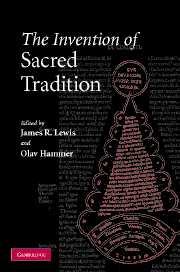Book contents
- Frontmatter
- Contents
- List of figures
- Notes on contributors
- Introduction
- 1 Scientology, scripture, and sacred tradition
- 2 “He may be lying but what he says is true”: the sacred tradition of don Juan as reported by Carlos Castaneda, anthropologist, trickster, guru, allegorist
- 3 The invention of sacred tradition: Mormonism
- 4 Antisemitism, conspiracy culture, Christianity, and Islam: the history and contemporary religious significance of the Protocols of the Learned Elders of Zion
- 5 The invention of a counter-tradition: the case of the North American anti-cult movement
- 6 “Heavenly deception”? Sun Myung Moon and Divine Principle
- 7 “Forgery” in the New Testament
- 8 Three phases of inventing Rosicrucian tradition in the seventeenth century
- 9 A name for all and no one: Zoroaster as a figure of authorization and a screen of ascription
- 10 The peculiar sleep: receiving The Urantia Book
- 11 Ontology of the past and its materialization in Tibetan treasures
- 12 Pseudo-Dionysius: the mediation of sacred traditions
- 13 Spurious attribution in the Hebrew Bible
- 14 Inventing Paganisms: making nature
- Index
- References
6 - “Heavenly deception”? Sun Myung Moon and Divine Principle
Published online by Cambridge University Press: 22 September 2009
- Frontmatter
- Contents
- List of figures
- Notes on contributors
- Introduction
- 1 Scientology, scripture, and sacred tradition
- 2 “He may be lying but what he says is true”: the sacred tradition of don Juan as reported by Carlos Castaneda, anthropologist, trickster, guru, allegorist
- 3 The invention of sacred tradition: Mormonism
- 4 Antisemitism, conspiracy culture, Christianity, and Islam: the history and contemporary religious significance of the Protocols of the Learned Elders of Zion
- 5 The invention of a counter-tradition: the case of the North American anti-cult movement
- 6 “Heavenly deception”? Sun Myung Moon and Divine Principle
- 7 “Forgery” in the New Testament
- 8 Three phases of inventing Rosicrucian tradition in the seventeenth century
- 9 A name for all and no one: Zoroaster as a figure of authorization and a screen of ascription
- 10 The peculiar sleep: receiving The Urantia Book
- 11 Ontology of the past and its materialization in Tibetan treasures
- 12 Pseudo-Dionysius: the mediation of sacred traditions
- 13 Spurious attribution in the Hebrew Bible
- 14 Inventing Paganisms: making nature
- Index
- References
Summary
“Therefore,” declares the Lord, “I am against the prophets who steal from one another words supposedly from me.”
(Jeremiah 23:30)Plagiarism has been in evidence since ancient times. Although it was considered permissible to copy and appropriate the writings of others, attributing to God the words of other human beings was beyond the pale, being arguably a violation of the third of the Ten Commandments, which proscribed the inappropriate use of the divine name (Exodus 20:7).
However, not all accusations of forgery, plagiarism, and imitation are justified. The history of religion is rife with “sacred inventions,” and detractors from controversial religious organizations are often only too willing to believe in the inauthenticity of a group's sacred texts. As James R. Lewis points out in his Legitimating New Religions, such accusations provide a plausible means of de-legitimating a religious movement. In this chapter I shall examine the accusation that Divine Principle – the key text of the Family Federation for World Peace and Unification (FFWPU, formerly the Unification Church, and popularly known as the “Moonies”) – is unoriginal, and substantially derived from another source. Amid the various accusations that have been leveled against the Family Federation, it is tempting for critics to assume that this is yet another of the movement's malpractices, and concepts such as “heavenly deception” – said to be a doctrine inherent in Unificationist theology – can easily lead to the conclusion that the FFWPU is comfortable with the belief that what is unacceptable by earthly standards can be justified if it is done for heavenly purposes.
- Type
- Chapter
- Information
- The Invention of Sacred Tradition , pp. 118 - 140Publisher: Cambridge University PressPrint publication year: 2007
References
- 1
- Cited by

